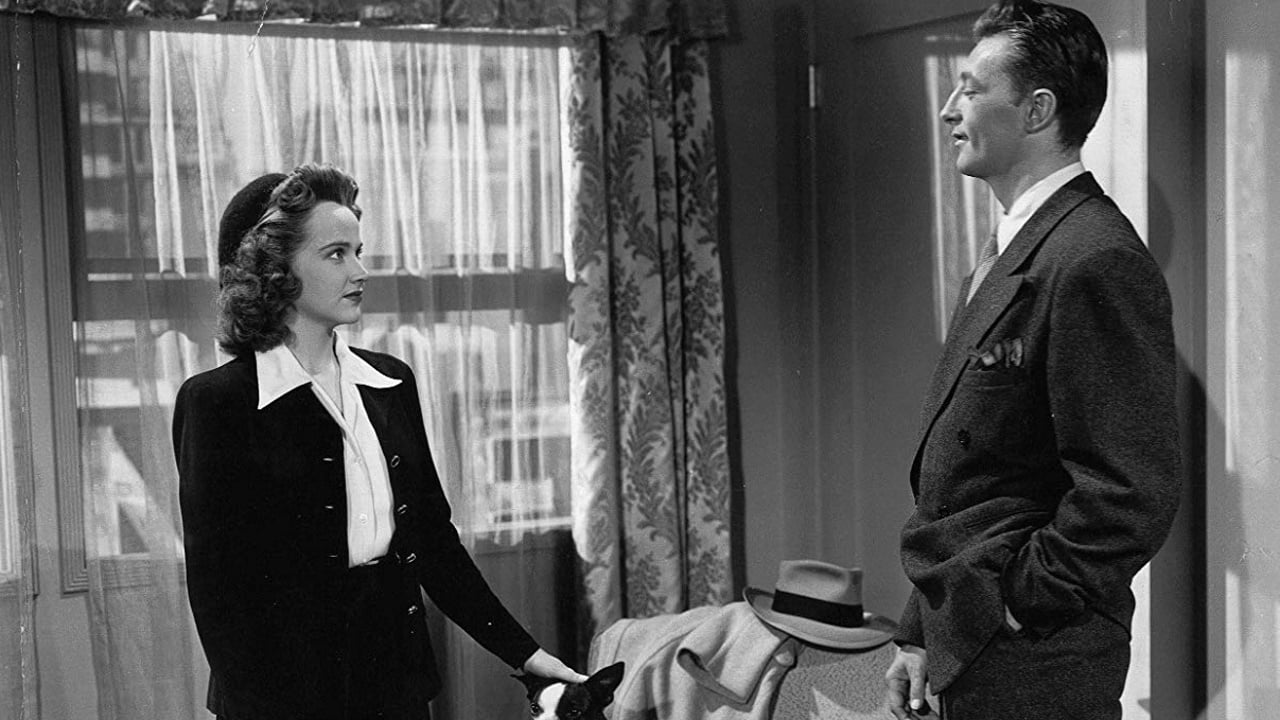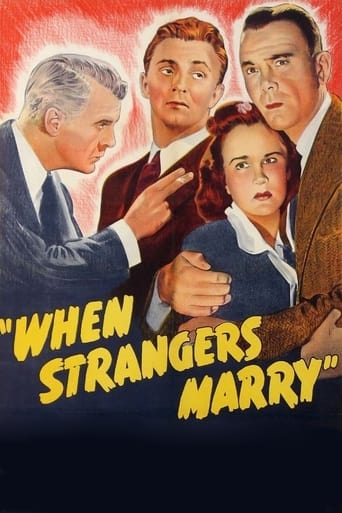Glucedee
It's hard to see any effort in the film. There's no comedy to speak of, no real drama and, worst of all.
Whitech
It is not only a funny movie, but it allows a great amount of joy for anyone who watches it.
Bea Swanson
This film is so real. It treats its characters with so much care and sensitivity.
Roxie
The thing I enjoyed most about the film is the fact that it doesn't shy away from being a super-sized-cliche;
Spikeopath
When Strangers Marry (AKA: Betrayed) is directed by William Castle and written by Philip Yordan and Dennis J. Cooper. It stars Dean Jagger, Kim Hunter, Robert Mitchum and Neil Hamilton. Music is by Dimitri Tiomkin and cinematography by Ira H. Morgan.A compact William Castle noir that finds Hunter marrying a man she barely knows (Jagger), only to find he may be a murderer. Robert Mitchum is on hand for help and advice…Well put together by Castle who keeps things brisk and simple whilst keeping the mystery element high, that in turn does justice to the decent script. There's plenty of noir touches, from expressionistic photography and up-tilts, to cool montages and feverish scenes. Some odd characters add to the psychological discord, while Tiomkin blends jazzy dance strains with "he's behind you" type rumbles.Cast performances are more solid than anything spectacular, but Mitchum serves very early notice of what a presence and icon he was to become. Some sequences look cheap, which for a Monogram cheapie is to be expected, and this type of pic has been done far better by others, notably Hitchcock and Lewton, both of whom Castle doffs his cap towards. But this never outstays its welcome and there's plenty here for the noir lover to get hooked on. 7/10
mark.waltz
Monogram produced a lot of stinkers, but they also had their share of classics. "When Strangers Marry" (under its re-release title "Betrayed" for the DVD), is one of the best. Ingenue Kim Hunter, years before Brando emotionally screamed "Stella!" to get her attention, plays an innocent young girl from Ohio who has been married for only a month to a man she hardly knew. In fact, he immediately went on the road on business, and has just sent for her to meet him in New York when she arrives and runs into an old flame (Robert Mitchum). The husband remains mysteriously out of site for a while, so she gets reacquainted with Mitchum before finally encountering her husband (Dean Jagger). It becomes apparent the moment he shows up that he is in trouble and may be the killer of a drunk man he admits to having rolled in Philadelphia.The fast-moving film noir like mystery presents its facts, adds on a couple more clues, and delivers the truth with a neat little twist that remains surprising even if it was a bit predictable. Neil Hamilton, an early 30's leading man (and later the police commissioner on "Batman") is fine as the investigator whom Mitchum and Hunter go to see to find Jagger. Hunter shows great promise and within a few years, would go onto film immortality in "A Streetcar Named Desire" and gain cult status by donning heavy make-up as Zira in "Planet of the Apes". Mitchum and Jagger are fine as well. This was one of Mitchum's first major roles after tons of walk-ons, and within a year of this, would be one of Hollywood's most popular "tough men", a new breed of leading actors like Kirk Douglas and Burt Lancaster that would change the way Hollywood made movies. This is a definite must see for fans of '40's "B" features.
Igenlode Wordsmith
I wouldn't have believed that this film could run barely over an hour in length; in the course of its 67 minutes, it crams in more plot twists, emotional punch and sheer tension than recent blockbusters can manage in 200 or more, with never a wasted moment... but no lack, either, of aching silences and endless hours at night. As the innocent, idealistic young wife adrift in a city and world utterly alien to her, Kim Hunter carries the whole film with a performance of breathtaking conviction. She is scarcely off-screen from start to finish, as the character grows and matures both in confidence and desperation, and our assumptions about the outcome shift off-balance from one moment to the next. 'When Strangers Marry' is without a doubt her film. It's also an emotional roller-coaster, a gripping piece of noir -- and, unbelievably, a no-budget miracle shot in just seven days.Robert Mitchum, in an early role, is a little wooden but crucially effective in the part of the former suitor who provides a steady shoulder for his one-time fiancée to lean on, and Dean Jagger is suitably elusive as the longed-for husband who is all but a stranger, but it is Hunter who really stands out here. I wasn't expecting much from this film but was absolutely swept away by it: an example above all of how to do a Hitchcock on Poverty Row.
FilmFlaneur
Castle's third feature is an interesting case of talents in the bud. Previously he had been responsible for a bright Boston Blackie series entry with Chester Morris, and the less successful Klondike Kate (1943) with Tom Neal. When Strangers Marry (also known by the less accurate title of Betrayed) shows the director's increasing confidence as he ventures into the territory of the new film noir genre. He was also lucky in securing the services of a good cast: Kim Hunter, Dean Jagger and, in his first co-starring role, a young Robert Mitchum. One of the greatest noir stars, Mitchum is slimmer and perhaps more tentative here than he would be in later films, but still has enough presence and skill to make an impact, especially in the sweaty closing scenes. Already an experienced hand, Dimitri Tiomkin provided the music, and the result was an above average production from Monogram.Having said that, there's a certain peremptoriness to the film, making it not entirely satisfactory. The noir style, which thrived on inexpensive sets and the economic use of shadow, cheap location shooting and the like, is evoked by Castle rather than expressed in any thorough fashion. Castle's next film The Whistler (1944), on yet another miniscule budget, was much more effective in evoking a continuous mood of paranoia and doom from the haunted Richard Dix. Some successful scenes apart, (Millie's first night in the hotel, her Lewtonish night walk, her innocent suspicions in Paul's apartment), the present film rather clumsily bolts noir elements on to a standard suspense plot - one vaguely reminiscent of Hitchcock's Suspicion of three years before - rather than to let them arise naturally from situation and character. An example is Millie's night of disturbed rest in the hotel. Husbandless in her neon sign-lit room, drowned in shadows and fear, she is distracted by the repeated blaring of nearby dancehall before taking a fraught phone call from Fred (Mitchum). This scene has no real plot purpose except to show her loneliness and distress, and the expressionist images seem over emphatic. On its own it is startling and dramatic, but nothing more, a pool of hard noir in a more naturalistic film. Even less convincingly, as if it had never happened Millie then makes no move to change her room later the next day, and the music never occurs again (it would have made an excellent punctuation for any later confrontation with Fred, for instance). As an actress, Kim Hunter makes an effective noir victim, even if her trusting fragility needs a willing suspension of disbelief. Powell and Pressburger obviously recognised such sensitivity even in a poverty row product like this, for they shortly cast her in such films as A Canterbury Tale, of the same year, and then in A Matter of Life and Death (1946).A more serious plot flaw resides in the character of her husband Paul (Jagger). His personality and motives are shrouded in mystery throughout the film and, sadly, are not much clearer by the end. For a while this enigmatic man provides the narrative with a lot of useful suspense. The lack of resolution to his drama, while supplying the necessary twist as the truth is revealed, leaves the viewer with just too many questions to be comfortable. One misses even the rudimentary psycho-analysis which appeared in some noirs from this time, supposedly explaining the aberrant personality. Either elements of helpful exposition were jettisoned in the course of filming on a tight budget, or the writers (who included the excellent Philip Jordan, of Dillinger, Detective Story, Big Combo fame) thought they could get away with such a lacuna. The result is to reduce a happy ending to one where a married couple must still live on unresolved tensions, their determined contentment notwithstanding.For those interested in trivia there are some private jokes in the film. A 'Mr King' is paged at the hotel (the film was produced by the King brothers). More amusingly, Millie hands over a deliberately misleading picture to the investigating detectives, saying 'This is the man you want'. It is director Castle. Such gallows humour, and self-publicity, would manifest itself in a series of gimmick films for which he is better known, starting in the 50's...

